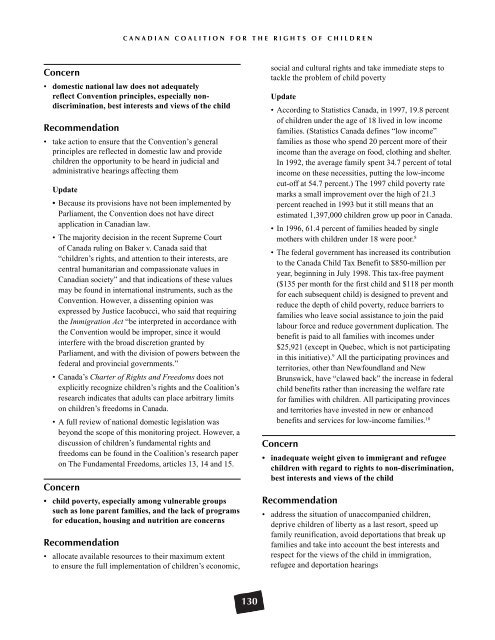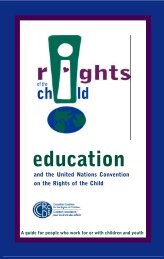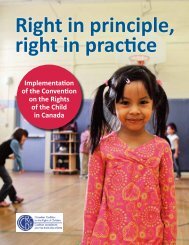Poste - Canadian Coalition for the Rights of Children
Poste - Canadian Coalition for the Rights of Children
Poste - Canadian Coalition for the Rights of Children
Create successful ePaper yourself
Turn your PDF publications into a flip-book with our unique Google optimized e-Paper software.
Concern<br />
C A N A D I A N C O A L I T I O N F O R T H E R I G H T S O F C H I L D R E N<br />
• domestic national law does not adequately<br />
reflect Convention principles, especially nondiscrimination,<br />
best interests and views <strong>of</strong> <strong>the</strong> child<br />
Recommendation<br />
• take action to ensure that <strong>the</strong> Convention’s general<br />
principles are reflected in domestic law and provide<br />
children <strong>the</strong> opportunity to be heard in judicial and<br />
administrative hearings affecting <strong>the</strong>m<br />
Update<br />
• Because its provisions have not been implemented by<br />
Parliament, <strong>the</strong> Convention does not have direct<br />
application in <strong>Canadian</strong> law.<br />
• The majority decision in <strong>the</strong> recent Supreme Court<br />
<strong>of</strong> Canada ruling on Baker v. Canada said that<br />
“children’s rights, and attention to <strong>the</strong>ir interests, are<br />
central humanitarian and compassionate values in<br />
<strong>Canadian</strong> society” and that indications <strong>of</strong> <strong>the</strong>se values<br />
may be found in international instruments, such as <strong>the</strong><br />
Convention. However, a dissenting opinion was<br />
expressed by Justice Iacobucci, who said that requiring<br />
<strong>the</strong> Immigration Act “be interpreted in accordance with<br />
<strong>the</strong> Convention would be improper, since it would<br />
interfere with <strong>the</strong> broad discretion granted by<br />
Parliament, and with <strong>the</strong> division <strong>of</strong> powers between <strong>the</strong><br />
federal and provincial governments.”<br />
• Canada’s Charter <strong>of</strong> <strong>Rights</strong> and Freedoms does not<br />
explicitly recognize children’s rights and <strong>the</strong> <strong>Coalition</strong>’s<br />
research indicates that adults can place arbitrary limits<br />
on children’s freedoms in Canada.<br />
• A full review <strong>of</strong> national domestic legislation was<br />
beyond <strong>the</strong> scope <strong>of</strong> this monitoring project. However, a<br />
discussion <strong>of</strong> children’s fundamental rights and<br />
freedoms can be found in <strong>the</strong> <strong>Coalition</strong>’s research paper<br />
on The Fundamental Freedoms, articles 13, 14 and 15.<br />
Concern<br />
• child poverty, especially among vulnerable groups<br />
such as lone parent families, and <strong>the</strong> lack <strong>of</strong> programs<br />
<strong>for</strong> education, housing and nutrition are concerns<br />
Recommendation<br />
• allocate available resources to <strong>the</strong>ir maximum extent<br />
to ensure <strong>the</strong> full implementation <strong>of</strong> children’s economic,<br />
130<br />
social and cultural rights and take immediate steps to<br />
tackle <strong>the</strong> problem <strong>of</strong> child poverty<br />
Update<br />
• According to Statistics Canada, in 1997, 19.8 percent<br />
<strong>of</strong> children under <strong>the</strong> age <strong>of</strong> 18 lived in low income<br />
families. (Statistics Canada defines “low income”<br />
families as those who spend 20 percent more <strong>of</strong> <strong>the</strong>ir<br />
income than <strong>the</strong> average on food, clothing and shelter.<br />
In 1992, <strong>the</strong> average family spent 34.7 percent <strong>of</strong> total<br />
income on <strong>the</strong>se necessities, putting <strong>the</strong> low-income<br />
cut-<strong>of</strong>f at 54.7 percent.) The 1997 child poverty rate<br />
marks a small improvement over <strong>the</strong> high <strong>of</strong> 21.3<br />
percent reached in 1993 but it still means that an<br />
estimated 1,397,000 children grow up poor in Canada.<br />
• In 1996, 61.4 percent <strong>of</strong> families headed by single<br />
mo<strong>the</strong>rs with children under 18 were poor. 8<br />
• The federal government has increased its contribution<br />
to <strong>the</strong> Canada Child Tax Benefit to $850-million per<br />
year, beginning in July 1998. This tax-free payment<br />
($135 per month <strong>for</strong> <strong>the</strong> first child and $118 per month<br />
<strong>for</strong> each subsequent child) is designed to prevent and<br />
reduce <strong>the</strong> depth <strong>of</strong> child poverty, reduce barriers to<br />
families who leave social assistance to join <strong>the</strong> paid<br />
labour <strong>for</strong>ce and reduce government duplication. The<br />
benefit is paid to all families with incomes under<br />
$25,921 (except in Quebec, which is not participating<br />
in this initiative). 9 All <strong>the</strong> participating provinces and<br />
territories, o<strong>the</strong>r than Newfoundland and New<br />
Brunswick, have “clawed back” <strong>the</strong> increase in federal<br />
child benefits ra<strong>the</strong>r than increasing <strong>the</strong> welfare rate<br />
<strong>for</strong> families with children. All participating provinces<br />
and territories have invested in new or enhanced<br />
benefits and services <strong>for</strong> low-income families. 10<br />
Concern<br />
• inadequate weight given to immigrant and refugee<br />
children with regard to rights to non-discrimination,<br />
best interests and views <strong>of</strong> <strong>the</strong> child<br />
Recommendation<br />
• address <strong>the</strong> situation <strong>of</strong> unaccompanied children,<br />
deprive children <strong>of</strong> liberty as a last resort, speed up<br />
family reunification, avoid deportations that break up<br />
families and take into account <strong>the</strong> best interests and<br />
respect <strong>for</strong> <strong>the</strong> views <strong>of</strong> <strong>the</strong> child in immigration,<br />
refugee and deportation hearings




